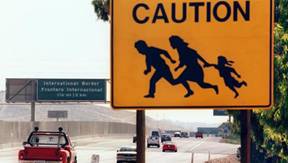Europe's Border Revolution – Kosovo's Isolation Confirmed (new ESI Report)
- Europe's Border Revolution – the inspiration of Berlin
- ESI's expanding map – from Afghanistan to Mexico
- Return to Europe in Moldova
- Talking Turkey and Turks
- EU foreign Policy and the future of liberal imperialism
- Border cultures – can the US and Mexico learn from Europe?
 |
Dear friends,
Last week ESI's White List Project Advisory board – which includes three former interior ministers from large EU member states, Giuliano Amato (Italy), Charles Clarke (United Kingdom) and Otto Schily (Germany) – met in Berlin to take stock of remarkable developments on the European visa front.
Our board welcomed the recent decision of the EU to grant citizens of Bosnia-Herzegovina and Albania visa-free travel to the Schengen area. It expressed the strong hope that once a readmission agreement will be signed with Turkey, which could happen soon, Ankara will also be given a visa liberalisation roadmap. This builds on the argument made in our most recent ESI Turkey report A very Special Relationship.
 |
 |
|
Kosovo's borders and the EU's credibility |
|
The board criticized the fact that Kosovo continues to be excluded from the visa roadmap process which had been offered to every other Balkan country in 2008. As a new ESI discussion paper which appears today – "Isolation Confirmed – How the EU is undermining itself in Kosovo" – notes, current EU policy is not only unfair and discriminatory towards Pristina, it is also detrimental to the EU's own interests in the region.
The EU has an interest to strengthen law enforcement institutions in Kosovo; to make repatriation of illegal residents feasible; and to bring down high numbers of asylum requests by Kosovo citizens. By far the best tool to achieve all this is to offer a visa roadmap to Kosovo without further delay. Without such a step the EU's crediblity as an honest broker on the eve of talks between Belgrade and Pristina would certainly suffer.
The Schengen White List Project board also discussed what we call Europe's border revolution: one of the most remarkable projects in European politics in the past quarter century.
These are exciting days not only for Bosnians and Albanians, but also for everyone wondering whether bold European visions can still be implemented in a pragmatic and evolutionary fashion.
As ESI's White List Project advisory board concluded on a note of confidence: Europe's border revolution – the attempt to implement on a continental scale a post-national approach to border management which provides both more liberty and more security – is going strong. This is reassuring evidence for any believer in the European project.
 |
 |
|
Future of intervention? – Global Border Lessons? |
|
ESI's expanding map – from Afghanistan to Mexico
Our guiding interest – and the vision that led us to create ESI in Sarajevo in 1999 and to expand our work to Pristina, Istanbul, Chisinau and Baku since – is the promise of a truly united, democratic and confident European continent. In this our strong focus – reflecting our own expertise – is on South East Europe. This will not change anytime soon.
At the same time, however, our work is sometimes taking us in a variety of different and sometimes surprising directions. Here are just a few examples from the most recent weeks.
 |
|
Return to Europe – new target audiences in Europe's East |
The main idea behind our ambitious 10-part documentary series Return to Europe was to capture new realities in South East Europe. To our own positive surprise we see that the Balkan experience is already beginning to inspire new democracies in Eastern Europe.
This is certainly true for visa policies, as we found earlier this year when visiting Chisinau with a former Macedonian deputy prime minister to share the Balkan reform story. But there are many more interesting issues.
When will Armenian-Azerbaijani relations resemble those between Serbia and Croatia today? When will Georgians be feeling safe with a similar (low) number of prisoners per capita as there is in Bosnia-Herzegovina or Macedonia? When will Russia be pursuing as constructive a policy in the Caucasus as Turkey does in the Balkans?
We are happy to contribute in a small way to a healthy debate on lessons learned from the Western Balkans. Earlier this year the whole Return to Europe series was broadcast – dubbed into Armenian – on TV in Yerevan. In the next months all ten parts of the series will be broadcast – in Romanian – on the new news channel Publika TV in Moldova.
 |
|
Necla Kelek – Fatih Akin |
A few weeks ago we launched a whole new website section on the intense German debate on Turkey: www.thegreatdebate.eu. We also published a report (with support of Erste Foundation): The Great Debate – Germany, Turkey and the Turks (Part 1).
Since then we have received a lot of feedback: including a whole feature on this debate on the most popular Austrian news website, orf.at. Expect more new material on this section – and a lot more debate - in coming weeks.
EU foreign Policy and the future of liberal imperialism
There seems to be a lot of interest in the public debate ESI is organising with Erste Stiftung this week in Vienna on Interventions, state building and the future of European Foreign Policy. The event will take place on Friday afternoon – 26 November 15:00.
Rory Stewart, Minna Jarvenpaa, Miroslav Lajcak and Gerald Knaus will discuss lessons from the experiences with regime change and state building efforts in the past two decades, from Bosnia to Kosovo, from Afghanistan to Iraq: What have we learned? What worked? Is this the dawn of a new era, in which a "responsibility to protect" overrides traditional state sovereignty? Or is the age of liberal imperialism, which begun in the mountains of the Balkans in the 1990s, coming to an end in Afghanistan, the graveyard of Empires? What does this generational experience mean for the EU?
If you are in or near Vienna join us. To register, please visit the ESI Facebook page.
Border cultures – can the US and Mexico learn from Europe?
Finally, we are looking forward to an interesting discussion in December at the Harvard Kennedy School, where we plan to launch a project on "Europe's Borders: Global Lessons. (click here for more information)". The basic questions we hope to discuss:
"US-Mexican relations have become gridlocked on many fronts. Immigration from Mexico to the US is a difficult political and policy issue that has been resistant to solution. Trafficking in drugs and weapons is not seriously addressed at a regional level. Both the US and Mexican policy elites have taken a defensive posture in the discourse rather than thinking in terms of integration, even as economic integration is moving forward. By taking a step back and using a comparative approach, we want to develop a new approach towards North American integration. We assume that there are interesting lessons to be learned from the European integration process."
We will update you on our findings on the ESI Border Revolution website section.
We also look forward to hearing from anyone with an interest in the global politics of border management, national or post-national.
Best wishes,

Gerald Knaus
- NEW – ESI Kosovo Paper "Isolation Confirmed" (Nov 2010)
- NEW – ESI EU Border Revolution website (Nov 2010)
- ESI Turkey Report "A very Special Relationship" (Nov 2010)
- Event – Intervention and EU foreign policy (26 Nov 2010)
- NEW - Rumeli Observer – Reflections on Intervention (Nov 2010)
- Germany's Great Debate on Turkey and the Turks (Oct 2010)
- ESI Documentaries – Return to Europe film series
